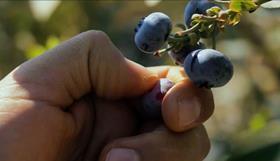
Agrovision posted record sales in 2021, shipping 30,000 tonnes of its own berries, asparagus and premium grapes over the last year. This represents a CAGR of more than 200 per cent over the last four years.
The company is now the third largest single grower and exporter of blueberries from Peru, with more than 70 per cent of plantings made up of advanced and improved genetics. This includes the largest global production of the new Sekoya varieties.
In Mexico, Agrovision has invested in a new 100ha farm growing premium genetic raspberries, blackberries, and blueberries offeings for the North America market.
It also plans to open a new trial farm this year for its in-house breeding programmes specifically focusing on raspberry and blackberry development.
“With all the challenges of supply during the last 24 months, Agrovision’s strategy to entirely control our production, fruit allocation and supply chain has been critical to our success,” said co-founder and executive chairman Steve Magami.
“Customers need that security more than ever and we are really excited by the response from retailers, with great interest to the improved flavour, firmness, and size of our product.”
Agrovision now has its own sales, marketing and forward distribution platforms in the US and Europe.
“We’re delighted with the progress made by The Fruitist in North America during 2021, and Agrovision Europe had a great first year of sales. In 2022 we are expanding our domestic packing operations to further respond to our retailer demands for quality and service,” Magami said.
This is just the beginning for the company’s expansion. Still only five years into berry production, a further 1,000+ hectares of recent plantings of the company's latest genetics in Peru, marking the largest premium berry production operation worldwide, will propel the business to more than double volumes again in the next two years.
The company’s blueberry sales volumes are projected to reach 40,000 tonnes 2023, rising to 50,000 tonnes in 2024 as existing plantings mature. This would put it on course to achieve global sales of US$500m a year, with more than 80 per cent of production coming from new, improved varieties.
In Mexico, Agrovision said it aims to increase its acreage to 500ha, while new farming projects are already underway in in North America, Europe and Morocco, with local partners.
“We are committed to our strategy of 52-week supply of a strong berry offering,” said Magami. “Our customers continue to demand better berries supplied to them directly by us through an integrated supply chain. So that is what we remain committed to doing.”
Magami said the company is committed to building ties with local communities at its operations in Peru, where it employs more than 15,000 people.
“Our mission is to provide stable and responsible economic opportunities for the community, improving the service to our farming team and providing real entrepreneur advancement,” he explained.
“We provided financing assistance and training for bus drivers during 2021 to launch their own transportation businesses.
“We are also very proud to have become the first South American EFI-certified company. Agrovision is also committed to being a responsible steward for positive environmental impact. I’m delighted the company’s Forest Reserve Project is a finalist in the prestigious Premios Verde Global Awards for Biodiversity.”
According to Magami, Agrovision’s vertical integration strategy is set to accelerate in 2022.
“That direct link is giving us increasingly valuable insight into where the market will develop next and the vast potential with our growth, and the opportunity to build long term supply plans with our leading retail customers,” he said.



